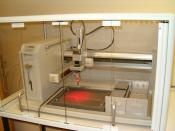American University of Armenia
Case: GE Healthcare in India: An (Ultra)sound strategy?
FTMBA 1st year
Course name: Managing people and organizations
Instructor: Mane Beglaryan
Group Members: Sona Hovhannisyan
Shushanik Hovsepyan
` Lilit Karapetyan
Yerevan 2014
Contents
Problem Identificationâ¦â¦â¦â¦â¦â¦â¦â¦â¦â¦â¦â¦â¦â¦â¦â¦â¦â¦â¦â¦â¦â¦â¦â¦â¦â¦â¦...2
Industry, Competitive and Environmental Assessmentâ¦â¦â¦â¦â¦â¦â¦â¦â¦â¦â¦â¦â¦â¦â¦.2
Quantitative Analysisâ¦â¦â¦â¦â¦â¦â¦â¦â¦â¦â¦â¦â¦â¦â¦â¦â¦â¦â¦â¦â¦â¦â¦â¦â¦â¦â¦â¦.5
Subjective Analysisâ¦â¦â¦â¦â¦â¦â¦â¦â¦â¦â¦â¦â¦â¦â¦â¦â¦â¦â¦â¦â¦â¦â¦â¦â¦â¦â¦â¦â¦6
Alternativesâ¦â¦â¦â¦â¦â¦â¦â¦â¦â¦â¦â¦â¦â¦â¦â¦â¦â¦â¦â¦â¦â¦â¦â¦â¦â¦â¦â¦â¦â¦â¦â¦.7
Recommendationsâ¦â¦â¦â¦â¦â¦â¦â¦â¦â¦â¦â¦â¦â¦â¦â¦â¦â¦â¦â¦â¦â¦â¦â¦â¦â¦â¦â¦â¦...8
Defense of Positionâ¦â¦â¦â¦â¦â¦â¦â¦â¦â¦â¦â¦â¦â¦â¦â¦â¦â¦â¦â¦â¦â¦â¦â¦â¦â¦â¦â¦â¦..8
Exhibitsâ¦â¦â¦â¦â¦â¦â¦â¦â¦â¦â¦â¦â¦â¦â¦â¦â¦â¦â¦â¦â¦â¦â¦â¦â¦â¦â¦â¦â¦â¦â¦â¦â¦â¦10
Problem Identification
GE Healthcare, which is one of the six businesses of General Electric (GE), is a multinational American technology and services corporation which was founded in 1890. This company had about 46.000 employees; the revenue had increased by $1.4 billion from 2005 reaching $16.6 billion in 2006. GE Healthcare operates in 6 different spheres: surgery, life sciences, IT solutions, diagnostic imaging, clinical systems and medical diagnostics. The company's offices exist in 11 countries including India. GE Healthcare India is a joint venture between GE and India's third-largest service provider Wipro Ltd. Since 2006 it was a leading company in ultrasound machine market.
The aims of ultrasound machine (sonograph) utilization were: detection of fetal defects during childbirth, identifying abnormal functions in the heart, identifying kidney stones, detecting prostate cancer early and so on. Despite the overall success in the market, GE Healthcare has faced the following problems
The machine was mostly used for prenatal gender determination, which resulted in the abortion of female fetuses and the number of girls decreased by 10 million since 1986.
Government officials started to seize the ultrasound machines, as according to India's Prenatal Diagnostic Techniques Act (PNDT) of 1994, the usage of machines to determine the sex of unborn children was illegal.
The company faced pushback from activists, as they accused GE of not doing much to prevent the illegal use of ultrasound machines, which resulted in negative PR for the company.
Industry, Competitive and Environmental Assessment
GE Healthcare first...


